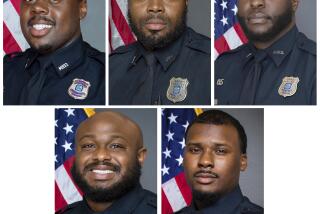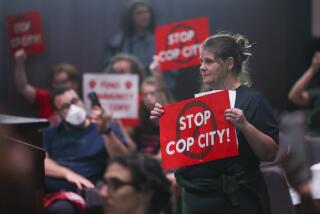Ex-trooper indicted in ’65 slaying
- Share via
ATLANTA — An Alabama grand jury indicted a former state trooper Wednesday in the fatal 1965 shooting of a black civil rights activist, a death that was a catalyst for the historic march from Selma to Montgomery.
Jimmie Lee Jackson, a 26-year-old church deacon, died from two gunshot wounds during a voter registration march in Marion, Ala. Witnesses have said he was protecting his mother and grandfather from state troopers wielding billy clubs.
Former trooper James Bonard Fowler, now 73, said that he fired his gun in self-defense after a struggle in which Jackson reached for Fowler’s holster.
The indictment of Fowler is the latest in a string of prosecutions of civil rights-era crimes. It promises to be one of the most interesting: George Beck, the attorney who successfully prosecuted Robert E. Chambliss in 1977 for the 1963 Birmingham church bombings that killed four black girls, will defend Fowler against the state’s case led by Michael Jackson, the first African American district attorney from the five-county area that includes Marion.
Jackson, who is no relation to the victim, said the 42-year-old case would hinge on “compelling witnesses” who would describe “the beatings and the whole drama of that night.” But he would not say whether any of those witnesses observed Fowler shoot Jackson.
After a two-hour review of the case, a grand jury in Perry County, Ala., found sufficient evidence to return a two-count indictment. Though the indictment is sealed, officials confirmed that Fowler was charged.
On the night of Feb. 18, 1965, about 500 civil rights activists were marching from the Zion United Methodist Church toward the Marion County Jail to protest the arrest of a voting rights worker when they encountered a line of law enforcement officers wielding batons. Suddenly, the street lights in that stretch of downtown went out.
According to witness affidavits taken in 1965, troopers chased a group of protesters into Mack’s Cafe and clubbed Jackson’s 82-year-old grandfather Cager Lee and his mother, Viola Jackson, knocking them to the ground. When Jackson went to help them, he was shot in the stomach.
Fowler has repeatedly said he fired his gun in self-defense. In a sworn statement made in 1965, he said an “assailant” attempted to take his gun from its holster and struck him twice with a bottle. As he staggered backward, this assailant “hit me across the head, still coming toward me, and on the next blow which struck my hand the gun fired.”
The shooting galvanized the voting rights movement. The Rev. Martin Luther King spoke at Jackson’s funeral, and on March 7, 1965, civil rights activists embarked on a 54-mile march from Selma to Montgomery. State troopers attacked the crowd with batons and tear gas, and the television images of the confrontation prompted a national outcry. Later that year, Congress passed the Voting Rights Act.
David J. Garrow, a senior research fellow at the University of Cambridge and author of “Bearing the Cross: Martin Luther King Jr. and the Southern Christian Leadership Conference,” said the Jackson case was “one of the most complicated cases of the civil rights era.”
He said Fowler, who in recent years has spoken openly about the incident, did not fit the “nefarious Klansman” model of previous civil rights-era slaying suspects.
Garrow said it was important not to assume that Fowler was guilty because of the actions of Alabama state troopers during that period.
“Were the Alabama state troopers guilty in the historical sense of guilt?” he asked. “Of course, but that’s a different question from whether Jimmie Jackson actually put his hand on James Fowler’s holster.”
*
More to Read
Sign up for Essential California
The most important California stories and recommendations in your inbox every morning.
You may occasionally receive promotional content from the Los Angeles Times.











